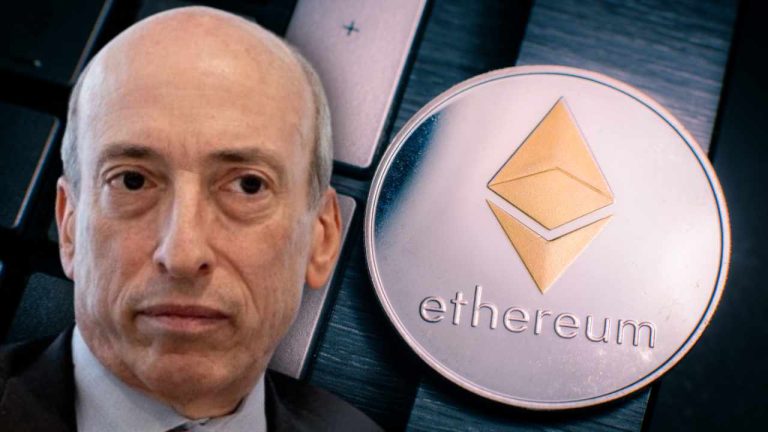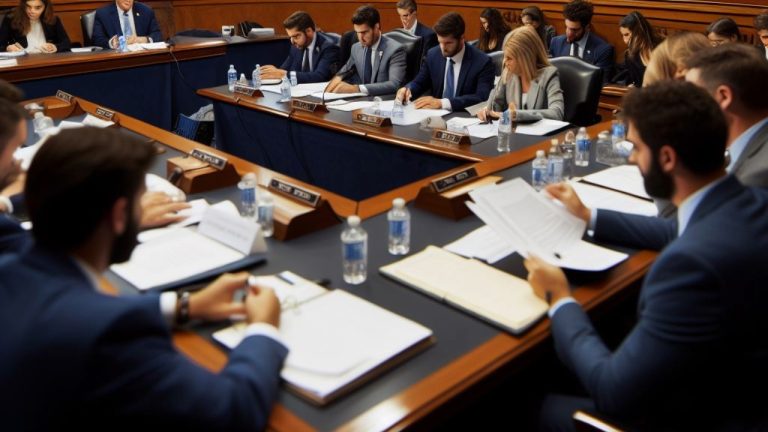 Forty-eight U.S. lawmakers have sent a letter to U.S. Securities and Exchange Commission (SEC) Chairman Gary Gensler asking him to clarify whether ether is a security. “The negative repercussions of the SEC implicitly or directly classifying ETH as a digital asset security will cascade throughout the digital asset marketplace both in the short and long […]
Forty-eight U.S. lawmakers have sent a letter to U.S. Securities and Exchange Commission (SEC) Chairman Gary Gensler asking him to clarify whether ether is a security. “The negative repercussions of the SEC implicitly or directly classifying ETH as a digital asset security will cascade throughout the digital asset marketplace both in the short and long […] The House Financial Services Committee of the U.S. Congress has advanced a resolution that seeks to disavow SEC SAB 121, a bulletin that leaves banks and financial institutions out of the cryptocurrency custody provider market. However, the resolution, advanced with bipartisan support, is unlikely to be passed at a vote on the House floor, according […]
The House Financial Services Committee of the U.S. Congress has advanced a resolution that seeks to disavow SEC SAB 121, a bulletin that leaves banks and financial institutions out of the cryptocurrency custody provider market. However, the resolution, advanced with bipartisan support, is unlikely to be passed at a vote on the House floor, according […]
A prominent crypto lawyer who helped Ripple Labs and XRP in the case against the U.S. Securities and Exchange Commission (SEC) is volunteering to represent US retail token holders during an upcoming Congressional hearing. Responding to an announcement made by the Financial Services GOP about the upcoming Capital Markets and Digital Assets, Financial Technology and […]
The post XRP Lawyer Volunteers To Represent Retail Token Holders in Upcoming US Congress Hearing appeared first on The Daily Hodl.

A prominent banking trade association is helping author Senator Elizabeth Warren’s Digital Asset Anti-Money Laundering Act. In a new announcement, Republican Senator Roger Marshall of Kansas, who co-sponsors the bill with Warren, says the American Bankers Association (ABA) had a hand in shaping the potential crypto legislation, which aims to force the crypto industry to […]
The post US Banking Industry’s Lobby Group Helped Write Elizabeth Warren’s Anti-Crypto Bill, According to Senator appeared first on The Daily Hodl.

Support for the Digital Asset Anti-Money Laundering Act is growing in Congress, but most bills sponsored by legislators never become law.
Senator Elizabeth Warren’s crypto Anti-Money Laundering bill has been causing a massive stir in the crypto industry. But some have pointed out that the senator’s bills have a track record of not going anywhere.
According to data from the bill-tracking platform GovTrack, Warren has introduced 330 bills during her 11 years as a senator. Ten of them were eventually folded into other bills and only one rather obscure bill has ever been enacted as is.
This was the National POW/MIA Flag Act, which requires the prisoner of war/missing in action flag to be displayed alongside the United States flag on certain Federal property.

The legislation, reintroduced in July, already has the support of several U.S. lawmakers, but critics have suggested it could threaten financial freedom and privacy.
Massachusetts Senator Elizabeth Warren, an outspoken critic of digital assets in the United States government, has announced that five more senators have agreed to cosponsor one of her bills aimed at cracking down on money laundering.
In a Dec. 11 announcement, Sen. Warren said Senators Raphael Warnock, Laphonza Butler, Chris Van Hollen, John Hickenlooper and Ben Ray Luján had backed her Digital Asset Anti-Money Laundering Act, reintroduced in July. According to Warren, the legislation specifically targeted illicit uses of crypto assets for money laundering and financing terrorism.
“I’m glad that five new senators are joining the fight to take action, including three members of the Banking Committee,” said Sen. Warren. “Our bipartisan bill is the toughest proposal on the table cracking down on crypto’s illicit use and giving regulators more tools in their toolbox.”

Hundreds of billions of dollars worth of fines have been paid by the four biggest banks in the US as JPMorgan’s chief executive sounds off against digital assets, saying they are for criminals. According to corporate misconduct data aggregator Violation Tracker, the big four banks of the US – Bank of America, Wells Fargo, Citigroup, […]
The post $181,034,960,000 in Fines Paid by Big Four US Banks As JPMorgan CEO Jamie Dimon Says Crypto’s for ‘Criminals’ appeared first on The Daily Hodl.

The pro-crypto bill is one of many before Congress that aims to promote the country’s deployment and use of blockchain technology.
A United States House Committee has unanimously passed a pro-blockchain bill, which would task the U.S. commerce secretary to promote blockchain deployment and thus potentially increase the country's use of blockchain technology.
On Dec. 5, the House Committee on Energy and Commerce voted 46-0 to pass H.R. 6572, the Deploying American Blockchains Act of 2023, in a session aiming to clear 44 pieces of legislation.
The 13-page blockchain bill would direct Secretary of Commerce Gina Raimondo to “take actions necessary and appropriate to promote the competitiveness of the United States related to the deployment, use, application, and competitiveness of blockchain technology or other distributed ledger technology.”

All 435 seats in the U.S. House of Representatives will be up for grabs in the 2024 election, with the future of crypto bills in the House Financial Services Committee uncertain.
Representative Patrick McHenry, chair of the United States House Financial Services Committee and a proponent of many pieces of crypto-focused legislation, will be retiring from Congress.
In a Dec. 5 statement, McHenry said he would not seek reelection to the U.S.
“This is not a decision I come to lightly, but I believe there is a season for everything and — for me — this season has come to an end,” said McHenry.
During his time as chair of the House Financial Services Committee, McHenry was one of the few crypto proponents in Congress who pushed for passing bills to establish regulatory clarity for digital assets.
“Chairman McHenry is an unparalleled leader who has consistently recognized the importance of responsible innovation and fit-for-purpose regulation in the financial sector,” said Sheila Warren, CEO of the Crypto Council for Innovation.
Related: Rep. Patrick McHenry blames White House for lack of urgency on stablecoin bill negotiations
Jake Chervinsky, soon-to-be former chief policy officer of the Blockchain Association, thanked McHenry on X (formerly Twitter) for his “leadership on crypto policy.” Some industry leaders on the social media platform expressed regret at the North Carolina Representative’s departure, including Coinbase president Emilie Choi.
You’ve had an incredible run.

U.S. Deputy Treasury Secretary Wally Adeyemo is issuing a warning to the crypto industry, saying it must crack down on illicit finance. Speaking at the 2023 Blockchain Association Policy Summit, Adeyemo says that the digital assets industry should self-regulate against illegal financial activities or regulators will have to clamp down even harder on the nascent […]
The post U.S. Deputy Treasury Secretary Wally Adeyemo Warns Crypto Industry To Take Action Against Illicit Finance appeared first on The Daily Hodl.